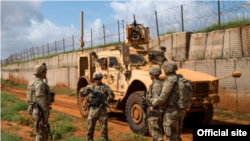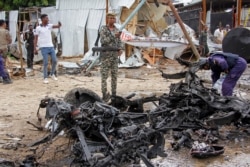Lawmakers and military officials in Somalia say the withdrawal of U.S. troops from the country, as reportedly proposed by President Donald Trump, would be disastrous and could embolden al-Shabab and other terrorist groups.
The secretary of Somalia’s Upper House Committee on defense, Senator Ahmd Hashi, said the proposal equates to the “United States under Trump turning its back on Somalis at a critical time.”
“As the country is heading to elections and terrorists’ threat remains strong, it's the most critical time we need the support of the United States,” Hashi told VOA’s Somali service. “For Somalia, a U.S. troop withdrawal means a setback and moral boost for terrorists.”
Somalia’s parliamentary elections are scheduled for late December, with the presidential election tentatively scheduled for February.
The New York Times reported this week that Trump is planning to withdraw nearly all of the 700 U.S. military personnel conducting training and counterterrorism missions in Somalia. The report said Trump also plans to order sharp troop reductions in Afghanistan and Iraq.
Hashi, who is also a former senior Somali military official, said withdrawing troops from Somalia would be “a terrible blow to the Somali Army.”
“They have been supporting the military operations and logistics of our elite commando forces, especially the Danab unit. Under their support, this unit has been building up and getting stronger day after day, but now, if they miss this significant support, it means a reverse and waste of all the efforts the United States has put into the rebuilding of the Somali National Army,” he said.
“We have received the news about the order of the withdrawal of our partner troops, but I do not know if it was the final and will be coming soon,” a Somali military official said on the condition of anonymity because he was not authorized to speak to the media about this matter.
“What I know is that such decision would be a dangerous setback to our gains in the fight against terrorism and relief for terrorists,” the official said.
The United States also conducts frequent airstrikes against al-Shabab, which began during the administration of President Barack Obama, but which have increased since Trump took office in 2017.
According to the Times report, the plan to remove U.S. troops from Somalia may not apply to U.S. forces stationed in nearby Kenya and Djibouti, where American drones that carry out airstrikes in Somalia are based.
Ahmed Abdi Ali, a former member of the Security Committee of Hirshabelle State Parliament, said the drone operations are the most important form of U.S. support for Somalia.
“The drones target the terrorist leaders in their hideouts and disrupt their operations and mobilization; therefore, they are very important for Somalia,” Ali said. “If the drone operations continue, I think U.S troops withdrawal won’t harm the general fight against the terrorists in Somalia."
Ali says rebuilding Somalia’s National Army is the only way to resolve the security challenges that have plagued Somalia for decades.
“Our partners help us when we need them, but they cannot stay with us forever. It is the Somali National Army’s responsibility to take over their country’s security and the Somali friends should help them in rebuilding to an extent they can face al-Shabab threats,” Ali said.
Abdisalam Yusuf Guled, former deputy head of the Somali National Intelligence and Security Agency, said a withdrawal of U.S troops from Somalia would allow al-Shabab to emerge from their hideouts in significant numbers and plan major attacks.
“Now, the militants are only capable of carrying out an infantry guerrilla style hit-and-run attacks, suicide bombings, and assassinations because the U.S troop presence in Somalia, their drone operations, and the logistical support to Somalia’s most powerful military Unit ‘Danab’ denied them free movements. If the U.S troops withdraws, the militants will come out from the jungle and their hideouts—this time with machine gun mounted vehicles and anti-aircraft guns,” Guled said.
Last month, Somalia’s President Mohamed Abdullahi Farmajo voiced support for keeping U.S. troops in the country. He said U.S. military support has enabled the country to combat al-Shabab, and he called for continuous security partnership and capacity-building support.
Seynab Abuka contributed to this report from Mogadishu.





